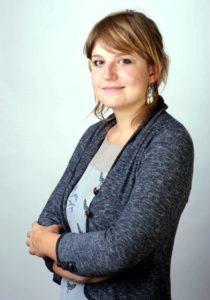Jan. 7, 2019 — PRACE is delighted to announce that Dr. Alice-Agnes Gabriel, Department of Earth and Environmental Sciences Geophysics, Ludwig-Maximilians-University of Munich (LMU) is the winner of the 2020 PRACE Ada Lovelace Award for HPC for her outstanding contributions to and impact on HPC in Europe.

Image courtesy of PRACE.
Dr. Alice-Agnes Gabriel, is a lecturer in Professor Heiner Igel‘s Chair of Seismology in the Institute of Geophysics, LMU. Her research is focusing on understanding the physics of earthquakes using theoretical analysis, physics-based forward models, innovative observation techniques and High-Performance Computing to bridge spatio-temporal scales.
Dr. Gabriel’s career is characterized by first-rate earthquake scenarios realised on some of the largest supercomputers worldwide. Her research work was nominated and awarded by several prizes such as one of the Finalist by Association for Computing Machinery (ACM) Gordon Bell Prize in 2014, at International Conference for High-Performance Computing, Networking, Storage, and Analysis (SC14), New Orleans, USA; and Best Paper Award, IEEE/ACM International Conference for High-Performance Computing, Networking, Storage, and Analysis (SC17), Denver, USA. Likewise, she was awarded the PRACE ISC Award at the International Supercomputing Conference ISC 14, Leipzig, Germany.
She contributes to two European Horizon 2020 projects, an Exascale Hyperbolic PDE Engine ExaHyPE (ended October 2019) and Center of Excellence In Solid Earth ChEESE, where the latter is a Centre of Excellence intended to bring together leading European researchers in Solid Earth research at the Barcelona Supercomputing Center for Exascale supercomputing. She is involved in two collaborative projects with the King Abdullah University of Science and Technology (KAUST) and two projects funded by the German Research Foundation – one of the two projects is Community Software for Reproducible Computational Seismology CoCoReCS resulted from an interdisciplinary call to support sustainable research software called SeisSol. On top of all this her project “TEAR – Truly Extended Earthquake Rupture” was awarded an ERC Starting Grant in 2019.
“Dr. Alice-Agnes Gabriel uses numerical simulations coupled to experimental observations to increase our understanding of the underlying physics of earthquakes. The work includes wide scales and can improve our knowledge and safety against these natural phenomena.” says Núria López, Chair of the PRACE Scientific Steering Committee.
For her outstanding research work, she is highly recognised in the geoscience community and invited as a keynote speaker at European and international conferences such as PASC Conference 2018, likewise, she is a presenter in several workshops and colloquia.
She has a strong commitment as a teacher. By using social media (@InSeismoland) she can engage and inform a wider public about her research work.
Overall, Dr. Gabriel serves as a special role model for STEM scientists and beyond.
Further articles about Dr Alice-Agnes Gabriels’ research:
- www.gauss-centre.eu/
news/ research-highlights/ article/ researchers-uncover-critical-role-of-direct-earthquake-motions-in-triggering-a-surprise-tsunami/ - www.en.uni-muenchen.de/
news/ newsarchiv/ 2019/ gabriel_erdbeben.html - www.gauss-centre.eu/
news/ research-highlights/ article/ researchers-create-largest-longest-multiphysics-earthquake-simulation-to-date/ - www.gauss-centre.eu/
news/ newsflashes/ article/ lmu-tum-research-team-wins-best-paper-award-at-sc17/ - www.en.uni-muenchen.de/
news/ press-services/ press-releases/ 2014/ pelties_seisol.html
About PRACE
The mission of PRACE (Partnership for Advanced Computing in Europe) is to enable high-impact scientific discovery and engineering research and development across all disciplines to enhance European competitiveness for the benefit of society. PRACE seeks to realise this mission by offering world class computing and data management resources and services through a peer review process. PRACE also seeks to strengthen the European users of HPC in industry through various initiatives. PRACE has a strong interest in improving energy efficiency of computing systems and reducing their environmental impact.
Source: PRACE


























































